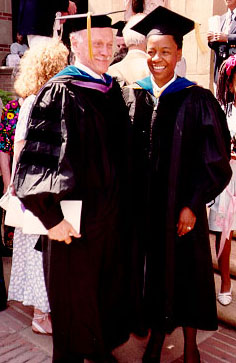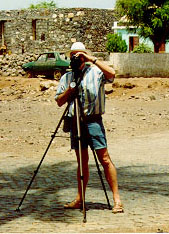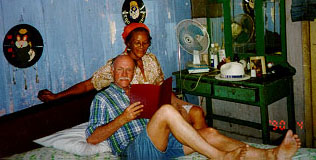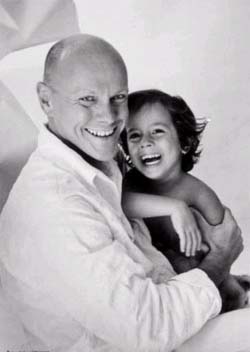| Professional Profile | CV | Books | Chowder Marchers | Contact |
|
|
PBH:
A Cautionary Profile, and Work Still(!) in Progress Born
in California, (he
credits fourteen boyhood
years’ of experiential deprivation in Glendale with his decision
to escape into anthropology),
Professor Hammond's university education began in Latin America,
first in Puerto Rico, (he
initially flunked economics and zoology but then picked up pretty
good Spanish);
later in Mexico, (where
he learned more anthropology backpacking in
Chiapas, Vera Cruz and Morelos than he did at college in
Mexico City).
Still later he studied in Europe, at the Sorbonne, (fear
of further flunking
drove him quickly to useful if grudging
fluency in Parisian French). PBH
returned to the U.S. for doctoral work in African Studies and
Anthropology at Northwestern University; |

|
As
a Fellow of the Ford Foundation, (after having amazingly survived his
pre doctoral prelims, etc.),
Professor Hammond’s first
ethnographic field research was
on technological innovation and culture change in Francophone West
Africa, (specifically,
among Mossi farmers
in what were then the two poor
French colonies of Haute Volta, now Burkina Faso, and the Soudan
Francais, now
called Mali. The result,
among other publications, was Yatenga, a book on the Mossi which
surprised him by creating the flattering -- but highly dubious --
impression among
some readers that he
understood the problematics of economic development not only in
Haute Volta, but also everywhere else in the Third Word!
Here he is in Yatenga with the farmers possesive kids
|
|
PBH's
later field work, funded by the National
Science Foundation,
was on ethnic identity conflict among Indians in the
Southeastern U.S., (working
with Indians who audaciously
defied
white folks’
including the Bureau
of Indian Affiars, definition
of who was (and was not) "a real"
Indian.)
In
addition to repeatedly generous support from UCLA's
Office of Instructional Development , Professor Hammond’s work has also been funded by the Wenner-Gren
Foundation for Anthropological Research. |
|

|
PBH
has held faculty appointments at the University
of Pittsburgh, (a terrific first teaching position offered to him
during a quick
breakfast meeting in NYC set up by his Old White
Boy Network);
at Indiana University,
(another
great teaching job, landed thanks to his O.W.B.N.
But
Bloomington’s
surrounding cornfields made him
uneasy);
and subsequently at The Johns Hopkins
University,
(where,
armed with a grant from
the National Science Foundation,
Dr. Hammond
did his Southeastern U.S. research
on Non-Federally Recognized Indians).
PBH is now an Emeritus Professor of Anthropology
at UCLA
(where has been happily
learning from his students
[The Chowder Marchers] [Here he is with one of the
Chowder Marchers, Dr. Sheilah Clarke-Ekong at her UCLA graduation],
enthusiastically teaching
and occasionally jousting
with his colleagues ever
since l981. Away from the Academy Dr. Hammond has served as Executive Director of the Division of Behavioral Sciences/ National Research Council/National Academy of Science in Washington, D.C., (resigning after one year in protest over NAS’ involvement in the Viet Nam War and also because he had the security of two book contracts!); and taught in the Department of Psychiatry at the George Washington University School of Medicine, (traumatizing his mostly white middle class pediatric residents in child psychiatry, by forcing them to visit the inner city homes, schools and neighborhoods of the black kids they were treating; so as to assess the relevance of children's culture for their effective diagnosis and realistic treatment). |

|
At
UCLA Professor Hammond
co-founded and served as co-chair of the University's Development
Studies Program (with
his amiable colleague and
occasional ideological adversary, Dr. Richard Sklar); and
established and directed both
the UCLA Applied Anthropology Program, (where
he and his students explored professional alternatives to opening an
Anthropology Store); and the Lusophone Africa Research Group, (where,
with faculty and student
colleagues, he
investigated
research possibilities and potential
pitfalls in the "PALOPs,”
the five Portuguese speaking countries in Africa;
as well as in Macau, Dieu, East Timor, and Brazil.
Subsequently Dr. Hammond’s strange obsession with learning
Portuguese was finally satisfied during three summers of
ethnographic field research in the West
African Republic of Cabo Verde [here
he is filming on the Cape Verdean island
of
Santiago] ,
and later in Portugal.
|

|
More
recently, ,
PBH has chaired the Chancellor's Task Force on Lesbian, Gay
and Bisexual Studies which led to the establishment of UCLA's
LGBT Studies Program. |

|
“Masculinities”
is the title of the other new
course he is developing. (PBH
and his
students will check out the
old anthropological issue of testosterone vs.socialization
as it relates to understanding why boys
and men cause so much
trouble in the world). Peter B. Hammond is a recipient of the Office of Instructional Development’s Mortar Board Award for Excellence in Teaching, as well as the Thais-Williams Professional Achievement Award from Lambda, the University’s Gay and Lesbian Alumni Association. (To the amazement of many, and to the undoubted chagrin of those few he has reluctantly flunked), PBH received UCLA's Luckman Medal for Distinguished Teaching in 1996 [Here he is with his wife and daughter and a rented tuxedo waiting to receive the award]. Five books and some sixty journal articles and book chapters are the product of Professor Hammond’s research and teaching interests. So far -- (For a take his theroretical approach check out the first chapter, "People, Society and Culture. of his text, AN INTRODUCTION TO CULTURAL AND SOCIAL ANTHROPOLOGY, [6.5 MB PDF file] (even as he becomes ever more absorbed with maintaining oxygen flow to his brain: PBH still uses the words of Booth, The New Yorker' cartoonist, to insistently ask the cultural anthropologists most basic question "what the hell is going on!")
|
